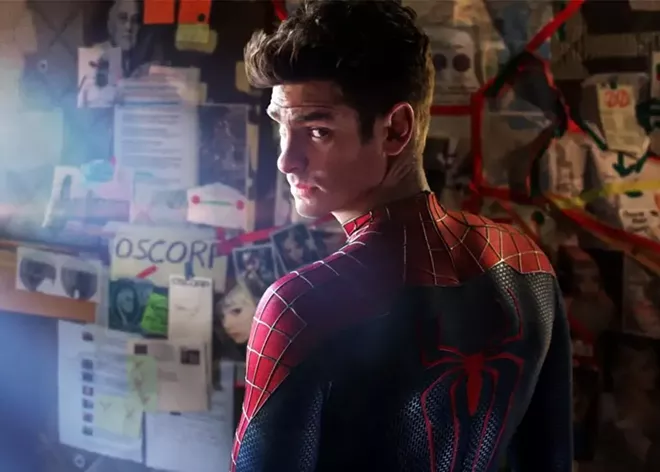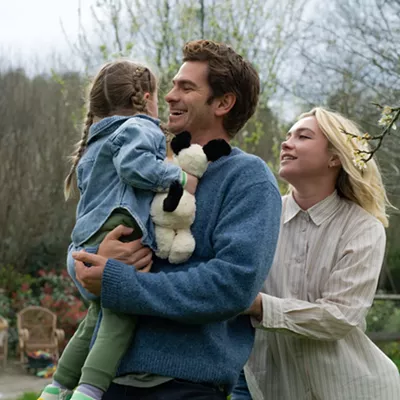Let's talk about Garfield. No, not the ravenous orange tabby who is returning to the screens this month via CGI wizardry. Rather, let's dig into British actor Andrew Garfield and his brief — and mostly unmemorable — turn as Marvel Comics hero Spider-Man.
The Amazing Spider-Man (2012) and The Amazing Spider-Man 2 are returning to theaters again as part of an ongoing rerelease of all the modern live action Spider-Man movies.
Following Sam Raimi's superhero-genre revivifying Spider-Man films starring Tobey Maguire and before the Tom Holland-led Marvel Cinematic Universe features, the Marc Webb-directed Amazing Spider-Man films are the misbegotten middle child when it comes to the exploits of the friendly neighborhood wall-crawler. They are the clear nadir for the franchise.
Sure, they had a tough act to follow, as Raimi's initial Spider-Man trilogy was a milestone of the superhero genre (and say what you will about the third movie, but it's not that bad). And the subsequent Spider-Man films of the MCU were huge successes, even if they fundamentally don't understand the character's primary appeal (i.e., he should be a down-on-his-luck loser with a heart of gold, not a billionaire's protege with a bottomless wealth of gadgetry).
It's easy to blame Sony for the woes of the Garfield Spideys, especially considering how thoroughly they've botched their Spider-Man-without-Spider-Man films focusing on the hero's rogues gallery: Morbius, Madame Web, etc. But Sony did strike gold with the Oscar-winning Into the Spider-Verse and its Oscar-nominated sequel Across the Spider-Verse. And, frankly? The original Venom rocks. So what went wrong with the Garfield movies?
First, some necessary context. The Spider-Man movie rights are a bit of a tangled web (sorry, couldn't help it). His tortuous journey to screen included an aborted adaption by infamous schlock-house Cannon Films and a weirdly horny pitch from none other than James Cameron before the property finally wound up in the hands of Sony (an entire article could be written about the ways in which Marvel Comics mainstay Stan Lee was criminally casual with respect to the intellectual property he co-owned and how he tried to make it in Hollywood; there's a reason why Marvel Comics was literally bankrupt in 1996). After years of lawyering, the wise decision was made to hire Raimi, and the rest is history.
Sort of.
Part of the Spider-Man rights deal required that Sony produce a new Spider-Man or Spider-Man-adjacent film every five years and nine months. Ergo the peaks and valleys of the franchise up until Sony made a bargain in 2015 with a then-ascendant Marvel Studios to license out Spider-Man for the MCU (in a pact that is even more complicated to parse).
On the surface, the Garfield reboot looked promising. He made an appearance in Hall H at the San Diego Comicon, pretending to be a fan and dressed in a thrift store Spidey costume, before unmasking himself and endearingly expressing his love for his "favorite" fictional character.
But the issues with The Amazing Spider-Man became clear through an unlikely source — North Korea's hack of internal Sony Pictures. Emails painted a picture of the malady that was to come. Executives cited "rising trends" among Millennials including EDM music, Snapchat and extreme workout routines as characteristics that should be grafted onto Spider-Man. These stabs at of-the-moment relevance are antithetical to the whole concept of Peter Parker.
Hence, The Amazing Spider-Man begins by introducing us to a nearly 6-feet tall Peter who skateboards and is conventionally attractive. The core premise that he is an uncool nerd who would be bullied in high school doesn't pass muster for one second. While Maguire was fittingly a bumbling dope, Garfield was a sexy badass. That's not Peter Parker.
Another big issue with these films is lore. Looking to find any avenue to differentiate the new chapters from the Raimi trilogy, the screenwriters decided to go all-in on the history of Peter's biological parents (they were spies, which weirdly is Marvel Comics canon).
To the films' credit, Garfield's chemistry with Emma Stone's Gwen Stacy is palpable, and the films do right by spotlighting the superhero's chatterbox bantering quality. But those two scarce positives hardly justify anyone stanning for this two-and-done franchise.
The material is sadly beneath an actor of Garfield's caliber. He excels at the aforementioned and obligatory quips, and shines when he's playing up the arachnid body-horror aspects of Peter's transformation. But...that's about it.
The wasted potential of Garfield in The Amazing Spider-Man films is really driven home in 2021's Spider-Man: No Way Home (also back in theaters June 3-6). Due to mulitverse machinations, Garfield's Spider-Man enters Holland's MCU. In this new setting, he's given the opportunity to play a very different version of Peter, one who has been hardened by loss upon devastating loss (spoilers for The Amazing Spider-Man 2). Despite the hardened edge, Garifeld's ineffable charm absolutely sings in his scenes opposite Maguire, and his big hero moment of moving retribution at the climax is both a callback to the reprehensible The Amazing Spider-Man 2 and a tidy full circle for his character.
If you're big on Garfield's endearing charisma, mid-aughts fashion (Emma Stone's wardrobe in these movies is a felony), or plots where scientists want to turn everyone into lizards and "goblin disease" is a real thing, The Amazing Spider-Man films' webs have been woven for thee. If not, it's healthy to remember that Spider-Man is a fundamentally flawed hero... and sometimes his movies are too. ♦
The Amazing Spider-Man returns to theaters May 6-10. The Amazing Spider-Man 2 returns to theaters May 13-16.




















